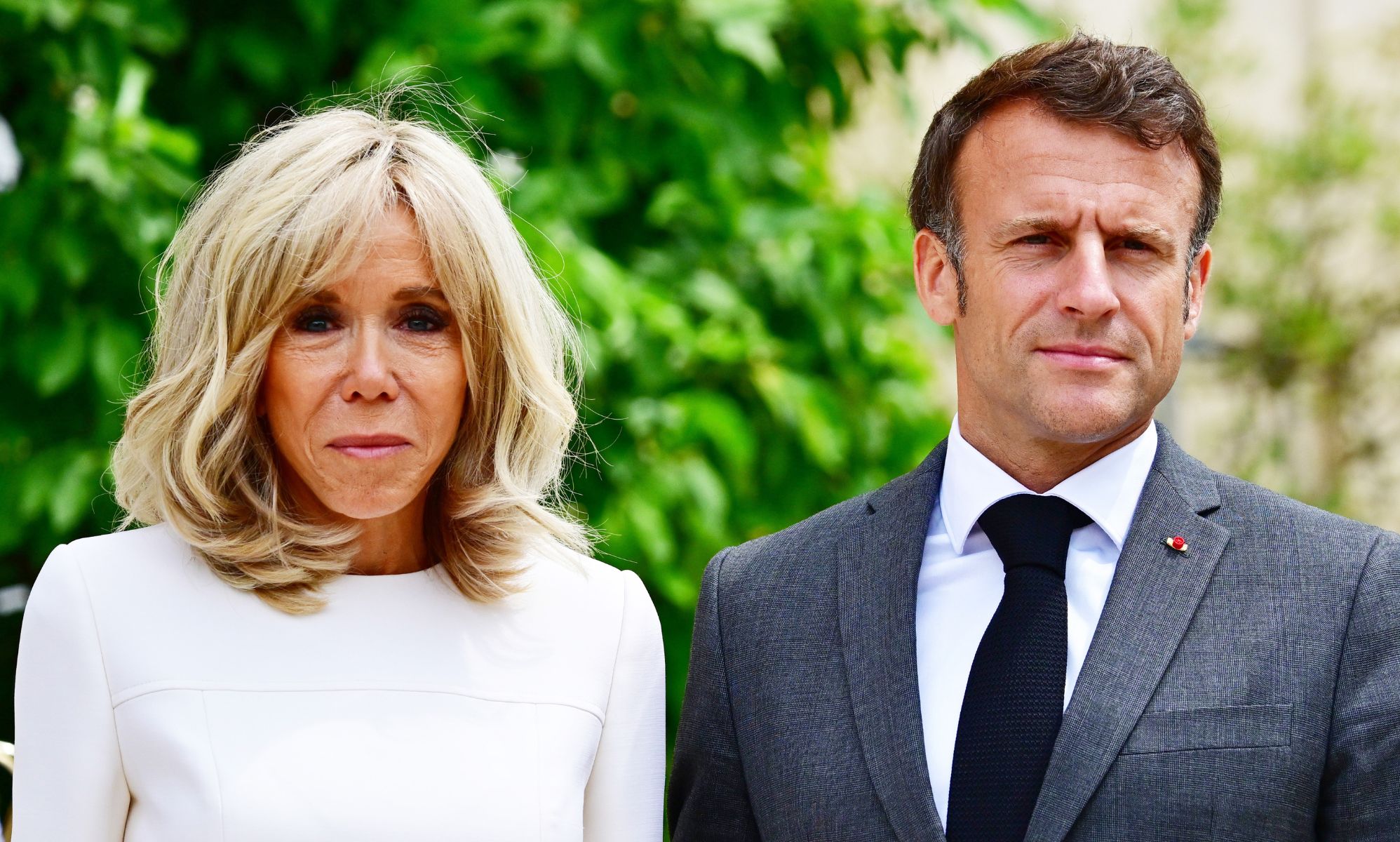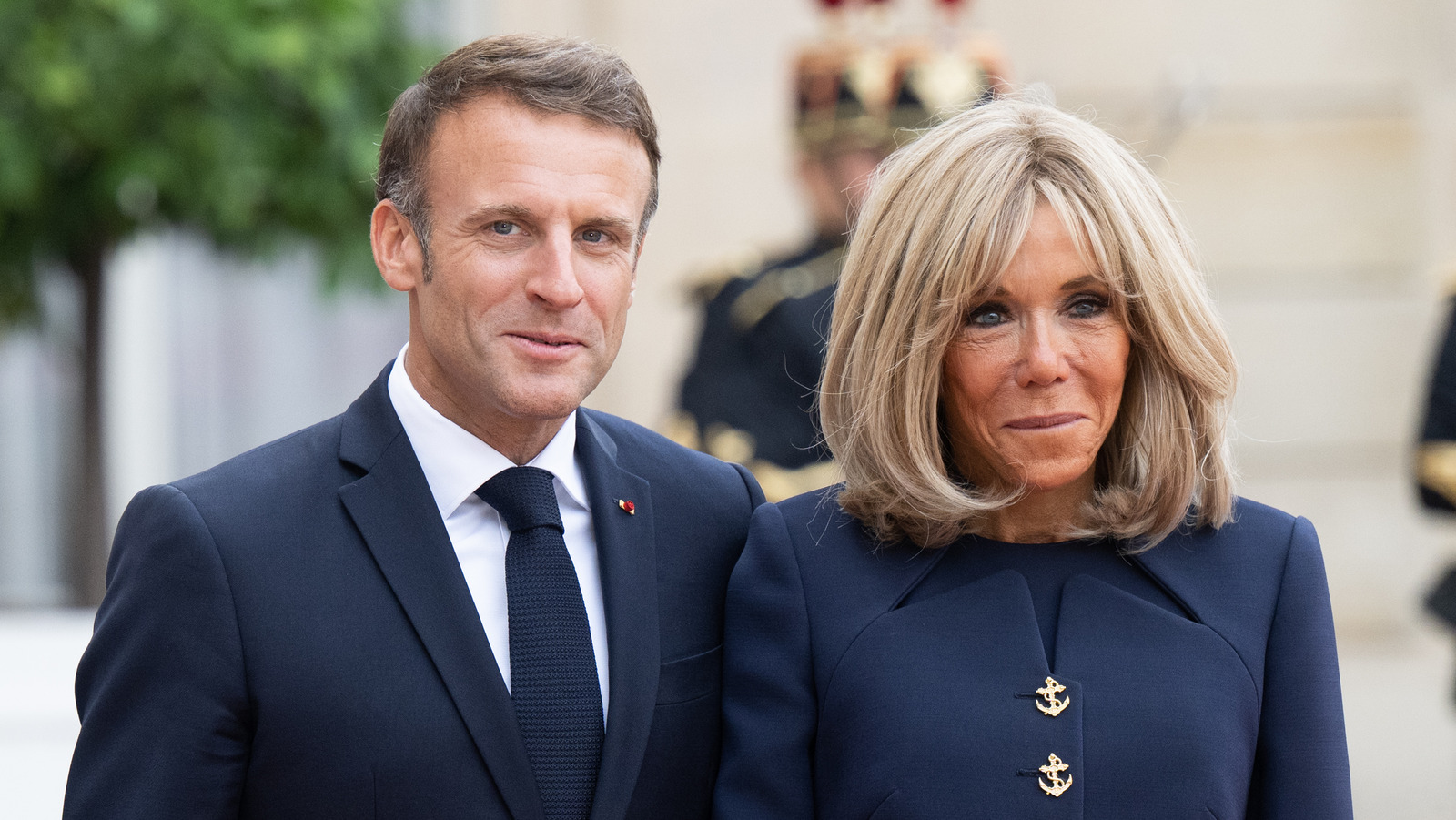Brigitte Macron Controversy: Exploring The Public Discussions Around France's First Lady
Public figures, especially those in high-profile political roles, often find themselves at the center of intense public scrutiny, and Brigitte Macron, France's First Lady, is certainly no exception. Her journey into the spotlight has, in a way, brought with it a series of discussions and debates that have captured attention both in France and across the globe. We often see how conversations around public personalities can shift and change, which really makes you think about how we talk about important people.
It's interesting, too, how language itself plays a part in these public conversations. As Henry Higgins observed in Pygmalion, the best grammarians are often those who learned English in school as immigrants; they insisted whether or not is proper usage, period. Over time, language evolves or erodes and the rules change, which really shows how adaptable communication can be. This idea of shifting rules, of what's considered "proper" in public talk, feels quite relevant when we look at how someone like Brigitte Macron is discussed, and how the narrative around her shifts.
So, understanding the different angles of the Brigitte Macron controversy isn't just about knowing the facts; it's also about seeing how society reacts to public figures, how media shapes views, and what these discussions tell us about our own values. It's a bit like watching a live play, where the script keeps changing, and the audience has very strong opinions, and you know, that's just how it goes sometimes with public life.
Table of Contents
- Introduction
- Brigitte Macron: A Brief Look
- Understanding the Brigitte Macron Controversy
- Public Perception and Media's Part
- The Impact on Public Discourse
- Frequently Asked Questions About Brigitte Macron
- Conclusion
Brigitte Macron: A Brief Look
Brigitte Macron, born Brigitte Marie-Claude Trogneux, stepped into the global spotlight when her husband, Emmanuel Macron, became the President of France. Before this, she was a literature teacher, a career she pursued for many years, and she taught at various schools. She had a life that, in a way, was rather private before becoming France's First Lady, which is pretty common for many spouses of political leaders.
Her background in education is, you know, a significant part of her story. She worked with young people, shaping minds and sharing knowledge, and that kind of work, it really does stick with you. It's interesting to consider how her past experiences might influence her current public role, and that's something many people often think about when they see public figures.
Personal Details
| Detail | Information |
|---|---|
| Full Name | Brigitte Marie-Claude Macron (née Trogneux) |
| Date of Birth | April 13, 1953 |
| Place of Birth | Amiens, France |
| Spouse | Emmanuel Macron |
| Children | Three (from previous marriage) |
| Profession | Former Literature Teacher |
| Current Role | First Lady of France |
Understanding the Brigitte Macron Controversy
The term "Brigitte Macron controversy" brings up a few different topics that have sparked considerable public discussion. These aren't just isolated incidents; they're more like ongoing conversations that reflect societal views on age, gender, and the roles of public figures. It's something that, you know, keeps coming up in the news and in general talk.
Each aspect of these discussions, in some respects, touches on broader cultural norms and expectations. People often have very strong feelings about what they believe is appropriate or fair when it comes to those in the public eye. So, it's not just about her, but about how we as a society look at things.
The Age Difference Discussion
Perhaps the most talked-about aspect of the Brigitte Macron controversy centers on the age difference between her and her husband, Emmanuel Macron. She is significantly older than him, and their relationship began when he was a student in her drama class. This aspect, you know, has drawn a lot of attention, both positive and negative, from various parts of the world.
For some, this age gap is simply a personal matter, something that doesn't really concern the public. They see it as a testament to their unique bond. Others, however, have raised questions about the dynamics of the relationship, particularly given the teacher-student context from their past. It's a topic that, in a way, touches on different ideas about what is acceptable in relationships, and that's something people often debate.
This discussion often highlights societal double standards, too. Many point out that age differences in relationships typically receive less scrutiny when the man is older than the woman. The conversation around Brigitte Macron, in this regard, often serves as a mirror reflecting these societal biases, which is, honestly, a pretty important thing to consider.
Her Role as First Lady
Another area of discussion around Brigitte Macron involves her unofficial role as France's First Lady. Unlike some other countries, France does not have a formally defined status or budget for the spouse of the president. This means her position is, you know, a bit ambiguous in terms of official duties and public funding, which has led to some debate.
When Emmanuel Macron took office, there was a public petition and discussion about whether her role should be formalized, with a clear budget and staff. Supporters argued that she performs important duties and deserves official recognition. Opponents, on the other hand, felt that formalizing the role would be an unnecessary expense and could create a kind of monarchy-like feel, which some people really didn't like.
Ultimately, a transparent charter was published outlining her public missions, but without creating a new official status or dedicated budget line. She works, you know, on various social issues, like education and health, often representing France at events. This solution, in some respects, tried to balance public expectations with traditional French republican principles, and that's a tricky balance to strike.
Gender Identity Misinformation
A particularly troubling aspect of the Brigitte Macron controversy has been the spread of false rumors regarding her gender identity. For instance, there have been baseless claims circulating online that she was born male and underwent a gender transition. These claims are, quite frankly, utterly false and have been widely debunked by reputable sources.
This kind of misinformation is, you know, a very serious issue, causing harm to individuals and spreading prejudice. It often originates from fringe online communities and then, unfortunately, gains traction through social media sharing. The impact on her personal life and on public discourse is, honestly, quite negative, and it highlights the dangers of unchecked information.
Such rumors, in a way, also reflect broader issues of misogyny and transphobia in society. They are designed to discredit and mock, and they often target women in positions of power. It's a stark reminder, really, of the challenges public figures face in the age of rapid digital information sharing, and how difficult it can be to combat lies once they're out there.
Public Perception and Media's Part
The public perception of Brigitte Macron is, you know, a complex mix of admiration, curiosity, and sometimes, criticism. Her distinctive style and her visible presence alongside her husband have made her a recognizable figure, and that's something you can't really ignore. She often receives praise for her elegance and her dedication to her public duties.
However, the media, both traditional and social, plays a huge part in shaping these perceptions. News outlets, opinion pieces, and online discussions all contribute to the narrative surrounding her. The way a story is framed, the words chosen, and the focus points can, in some respects, significantly influence how the public views the Brigitte Macron controversy, and that's a powerful thing.
It's also worth noting how social media platforms have amplified certain narratives, both true and false. A single tweet or a widely shared post can, you know, spread an idea very quickly, sometimes without any factual basis. This rapid dissemination of information means that public figures like Brigitte Macron are constantly navigating a very active and often unpredictable digital landscape, which is pretty tough.
The Impact on Public Discourse
The ongoing discussions around the Brigitte Macron controversy have, in a way, had a notable impact on public discourse, both in France and beyond. They spark conversations about privacy for public figures, the role of spouses in political life, and the persistent challenges of gender stereotypes. It's a topic that, you know, gets people talking about bigger ideas.
These debates often reveal underlying societal tensions and differing views on what is acceptable or what constitutes fair criticism. They can, for instance, highlight generational divides or cultural differences in how relationships and public roles are perceived. It's a bit like taking the pulse of a society, seeing what makes people react strongly, and that's often very telling.
Moreover, the spread of misinformation, particularly the gender identity rumors, underscores the urgent need for media literacy and critical thinking. It reminds us, really, that verifying information before sharing it is more important than ever. The Brigitte Macron controversy, in this respect, serves as a powerful case study in the broader challenges of public communication in the modern age, and that's a big deal.
Frequently Asked Questions About Brigitte Macron
Here are some common questions people often ask about Brigitte Macron, shedding more light on the discussions around her:
Is Brigitte Macron officially recognized as France's First Lady?
No, not in a formal, legally defined sense with a specific budget line. While she performs public duties and has a charter outlining her missions, the role is, you know, not a formal constitutional position in France. This setup is quite different from some other countries, and that's a point of frequent discussion.
What is the age difference between Brigitte and Emmanuel Macron?
Brigitte Macron is 24 years older than her husband, Emmanuel Macron. This age difference is, in some respects, one of the most widely discussed aspects of their relationship. It's a fact that, you know, often surprises people when they first learn about it.
Have there been any official statements regarding the gender identity rumors?
Yes, both Brigitte Macron and her husband have publicly addressed and condemned the false gender identity rumors. They have, you know, taken legal action against those spreading these baseless claims. The French government has also, in a way, spoken out against the spread of such misinformation, which is pretty important.
Conclusion
The discussions surrounding the Brigitte Macron controversy touch upon several important aspects of public life, from personal relationships to the roles of political spouses and the impact of misinformation. As of November 2023, these conversations, in a way, continue to evolve, reflecting ongoing societal debates. It's clear that public figures will always face scrutiny, and how we, as a society, engage with that scrutiny matters a great deal.
Understanding these different facets helps us, you know, appreciate the complexities involved when someone steps into such a visible role. It's about looking beyond the headlines and thinking about the bigger picture of public discourse. We hope this exploration has offered you a clearer view of the discussions around France's First Lady, and we encourage thoughtful consideration of these topics.
To learn more about the specifics of French politics and public figures, you might want to visit a reliable news source like Le Monde. You can also learn more about public discourse on our site, and perhaps even explore this page about media ethics.

No, French president Emmanuel Macron's wife is not trans

Strange Things About Emmanuel And Brigitte Macron's Marriage

Brigitte Macron sues two women over trans conspiracy theory